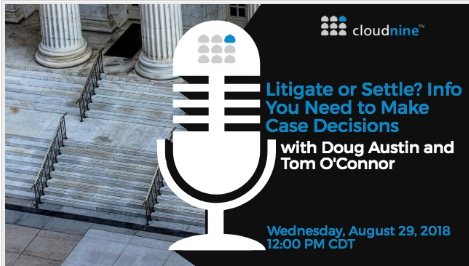The International Legal Technology Association (ILTA) annual educational conference of 2018 (known as ILTACON) kicked off yesterday with several networking events, and begins in earnest today with the first day of sessions. As always, eDiscovery Daily will once again be covering the show and, this year, CloudNine will exhibiting at the show and participating in a major way. Over the next four days, we will provide a description each day of some of the sessions related to eDiscovery to give you a sense of the topics being covered.
In addition to exhibiting at the show in booth 936, CloudNine will also host a happy hour on Tuesday, August 21 from 4:30 to 6:30pm ET at the National Harbor’s Public House (click here to register). Come and get to know CloudNine, your provider for LAW PreDiscovery®, Concordance® and the CloudNine™ SaaS platform! We’re also going to be the sunglass sponsor for the ACEDS Monumental Sunset Cruise on Wednesday, August 22 from 7:00 to 10:00pm ET!
If you’re in the Washington DC area, come check out the show at the Gaylord National Resort in National Harbor, MD – there are a number of sessions available and as many as 209(!) exhibitors providing information on their products and services. Sessions of interest (including one I’m speaking at today at 1pm!) in the main conference tracks include (all times ET):
11:00 AM – 12:00 PM:
The Future of eDiscovery: A Discussion Amongst Industry Leaders: What does the future of eDiscovery hold? Hear from industry leaders as they discuss their predictions of both the short and long-term future of the eDiscovery market. They’ll analyze anticipated disrupters and how their organizations are planning for change. Additionally, they’ll share practical steps for law firms to begin preparing themselves today.
Takeaways:
- Hear from industry vision leaders on what they see as our future in the eDiscovery space will be and how they are planning for any change within their organization.
- Learn about the market disruptors?
- What should law departments or law firms be thinking and preparing for?
Speakers include: Andrew Sieja, President & CEO Relativity; Jay Leib, Founder and CEO NexLP; Erin Harrison, Managing Director Baretz+Brunelle; Atanu Banerjee, Group Program Manager Microsoft Corporation.
1:00 PM – 2:00 PM:
eDiscovery Training Roadmap: In this interactive and informative session, we will walk through how to train and develop your eDiscovery staff. The discussion will help you determine who the stakeholders are and what skills do they need to succeed. We will also discuss eDiscovery best practices, training strategies, and defining work processes. The discussion will include types of training that won’t work and war stories from our veteran eDiscovery experts.
Speakers include: Gillian Glass, Director of Practice Support, Paralegals and Records Farella Braun + Martel LLP; Joy Murao, Founder, CEO Practice Aligned Resources.
eDiscovery and Litigation Support for Small Firms: Which Hat Should I Wear Today?: eDiscovery is a critical component of litigation these days. Learn how small firms can effectively manage eDiscovery and litigation support without a dedicated department and while juggling multiple tasks.
Speakers include: Brett Burney, Principal Burney Consultants; Doug Austin, Vice President of Products & Services CloudNine; Dana Wesley Sarti, Litigation Support Coordinator, Information Security Contact Robbins, Russell, Englert, Orseck, Untereiner & Sauber LLP; Sherry Rather, Litigation Support Coordinator Robbins, Russell, Englert, Orseck, Untereiner & Sauber LLP.
2:30 PM – 3:30 PM:
Managing Out-of-the-Ordinary Projects in eDiscovery: How does your firm approach out-of-the-ordinary projects? This session will provide hands on practical information on how to approach non-ordinary projects. Every project should be approached in the same manner, using fundamental project management steps. We will review these steps and provide insight on how some special projects were successful using these fundamentals.
Speakers include: Michael Quartararo, Managing Director eDPM Advisory Services; Richard Brooman, Litigation Support Project Manager Saul Ewing Arnstein & Lehr; Jessica Hasen, Counsel, E-Discovery Services and Strategy Perkins Coie; Jeremiah Weasenforth, Managing Project Attorney Orrick, Herrington & Sutcliffe LLP.
And, of course, you don’t want to miss the Exhibit Hall Opening Reception from 7:00 PM – 9:00 PM ET, where “there’s an open world of video games at ILTA’s Partner Video Game HQ” where attendees can play lots of video games while enjoying food and drink. Come join us at booth #936 and try to beat us in a game of Mario Kart 8 – you could win a Nintendo Switch!
So, what do you think? Are you planning to attend ILTACON this year? Please share any comments you might have or if you’d like to know more about a particular topic.

Sponsor: This blog is sponsored by CloudNine, which is a data and legal discovery technology company with proven expertise in simplifying and automating the discovery of data for audits, investigations, and litigation. Used by legal and business customers worldwide including more than 50 of the top 250 Am Law firms and many of the world’s leading corporations, CloudNine’s eDiscovery automation software and services help customers gain insight and intelligence on electronic data.
Disclaimer: The views represented herein are exclusively the views of the author, and do not necessarily represent the views held by CloudNine. eDiscovery Daily is made available by CloudNine solely for educational purposes to provide general information about general eDiscovery principles and not to provide specific legal advice applicable to any particular circumstance. eDiscovery Daily should not be used as a substitute for competent legal advice from a lawyer you have retained and who has agreed to represent you.






